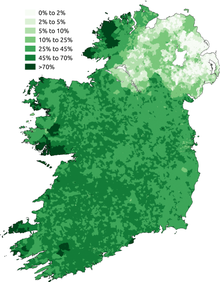Irish language Figures | Common words and phrase | References | Navigation menugagleiris1253"7. The Irish language""2011 Census, Key Statistics for Northern Ireland"the original"Irish"Sin Fein talks about the Gaeltacht Quarter
Languages with ISO 639-2 codeLanguages with ISO 639-1 codeCeltic languagesIrelandLanguages of Europe
languageIrelandCeltic languageScottish GaelicCornishWelshpoetspoemssongsheroesQueen Elizabeth I of EnglandRoman Catholic ChurchRepublic of IrelandGaeltachtFalls RoadBelfast CityGaeltacht QuarterGaeltachts
Irish language
Jump to navigation
Jump to search
| Irish | |
|---|---|
| Gaeilge | |
 "Gaelach"[needs to be explained] in traditional Gaelic type | |
| Pronunciation | [ˈɡˠeːlʲɟə] |
| Native to | Ireland |
| Region | Ireland, mainly Gaeltacht regions |
Native speakers | 73,804 in Ireland (2016)[1] 4,166 in Northern Ireland[2] L2 speakers: 1,761,420 in the Republic of Ireland (2016),[1] 104,943 in Northern Ireland (2011)[2] |
Language family | Indo-European
|
Early forms | Primitive Irish
|
Standard forms | An Caighdeán Oifigiúil |
Writing system | Latin (Irish alphabet) Irish Braille |
| Official status | |
Official language in | |
Recognised minority language in | |
| Regulated by | Foras na Gaeilge |
| Language codes | |
| ISO 639-1 | ga |
| ISO 639-2 | gle |
| ISO 639-3 | gle |
| Glottolog | iris1253[4] |
| Linguasphere | 50-AAA |
 Proportion of respondents who said they could speak Irish in the Republic of Ireland and Northern Ireland censuses of 2011. | |
Irish, Irish Gaelic, or Gaeilge is a language spoken in Ireland. Irish is a Celtic language. This means that Irish is similar to Scottish Gaelic, Breton, Cornish, Manx and Welsh. Many people who speak Irish can understand some Scottish Gaelic, but not Welsh. This is because the Celtic languages are divided into two groups. One group is called the p-Celtic languages and the other is called the q-Celtic languages. Irish and Scottish Gaelic are q-Celtic languages and Welsh is a p-Celtic language. Irish has no "yes" or "no" words. There were great poets who wrote in Irish. Their poems became the songs of the people. People told stories about the heroes of old times. Many of the poems were about them. At one point Queen Elizabeth I of England and Ireland promoted Irish with a view to using it to translate the Bible into that language and tried to learn it herself. Christopher Nugent, ninth Baron of Delvin gave her a primer about it.[5]
Until the nineteenth century, most people in Ireland spoke Irish, this changed after 1801 because after Ireland joined the United Kingdom, its state schools were incorporated into the British system and required to only teach or even allow English speaking. The Roman Catholic Church also began to discourage Irish and Daniel O'Connell, though a nationalist and an Irish speaker himself, discouraged it, because most job opportunities were in the USA and the British Empire.
Today, Irish is the first official language of the Republic of Ireland, although in practice English retains a dominant position in government. It is not spoken by most Irish people outside the Gaeltacht for day-to-day life, but a lot of people speak it daily also or when among friends or family. It has to be taught in all schools in Ireland.
The newest Gaeltacht in Ireland is on the Falls Road in Belfast City where the whole community has been making Irish their first language for several years. This area is called the Gaeltacht Quarter.[6]
Figures |
There are around 1.5 million speakers. The places where Irish is spoken a lot are called Gaeltachts or, in Irish, Gaeltachtaí. Around 70% of the people in these areas can speak Irish.

These are Gaeltacht areas
Common words and phrase |
- aon = one (a-n)
- dó = two (doe)
- trí = three (tree)
- ceathair = four (cah-her)
- cúig = five (coo-igg)
- sé = six (shay)
- seacht = seven (shocked)
- ocht = eight (uk-ed)
- naoi = nine (knee)
- deich = ten (de)
- céad = one hundred
- dhá chéad = two hundred
- Dia Dhuit = Hello (literal translation is "God be with you")
- Céad Mile Fáilte = One hundred thousand welcomes
- Ceist ag éinne? = Anyone have a question?
- Éire = Ireland
- go maith = good
- Slán = goodbye
- Leabhar = book
- Madra = dog
References |
Irish edition of Wikipedia, the free encyclopedia |
↑ 1.01.1 "7. The Irish language" (PDF). Cso.ie. Retrieved 24 September 2017..mw-parser-output cite.citationfont-style:inherit.mw-parser-output .citation qquotes:"""""""'""'".mw-parser-output .citation .cs1-lock-free abackground:url("//upload.wikimedia.org/wikipedia/commons/thumb/6/65/Lock-green.svg/9px-Lock-green.svg.png")no-repeat;background-position:right .1em center.mw-parser-output .citation .cs1-lock-limited a,.mw-parser-output .citation .cs1-lock-registration abackground:url("//upload.wikimedia.org/wikipedia/commons/thumb/d/d6/Lock-gray-alt-2.svg/9px-Lock-gray-alt-2.svg.png")no-repeat;background-position:right .1em center.mw-parser-output .citation .cs1-lock-subscription abackground:url("//upload.wikimedia.org/wikipedia/commons/thumb/a/aa/Lock-red-alt-2.svg/9px-Lock-red-alt-2.svg.png")no-repeat;background-position:right .1em center.mw-parser-output .cs1-subscription,.mw-parser-output .cs1-registrationcolor:#555.mw-parser-output .cs1-subscription span,.mw-parser-output .cs1-registration spanborder-bottom:1px dotted;cursor:help.mw-parser-output .cs1-ws-icon abackground:url("//upload.wikimedia.org/wikipedia/commons/thumb/4/4c/Wikisource-logo.svg/12px-Wikisource-logo.svg.png")no-repeat;background-position:right .1em center.mw-parser-output code.cs1-codecolor:inherit;background:inherit;border:inherit;padding:inherit.mw-parser-output .cs1-hidden-errordisplay:none;font-size:100%.mw-parser-output .cs1-visible-errorfont-size:100%.mw-parser-output .cs1-maintdisplay:none;color:#33aa33;margin-left:0.3em.mw-parser-output .cs1-subscription,.mw-parser-output .cs1-registration,.mw-parser-output .cs1-formatfont-size:95%.mw-parser-output .cs1-kern-left,.mw-parser-output .cs1-kern-wl-leftpadding-left:0.2em.mw-parser-output .cs1-kern-right,.mw-parser-output .cs1-kern-wl-rightpadding-right:0.2em
↑ 2.02.1 "2011 Census, Key Statistics for Northern Ireland" (PDF). Nisra.gov.uk. Archived from the original (PDF) on 8 March 2013. Retrieved 10 June 2017.
↑ [1]
↑ Hammarström, Harald; Forkel, Robert; Haspelmath, Martin, eds. (2017). "Irish". Glottolog 3.0. Jena, Germany: Max Planck Institute for the Science of Human History.
↑ The Field Day Anthology of Irish Writing Volume IV Irish Women's Writings and Traditions Deane, Seamus Angela Bourke Andrew Carpenter Jonathan Williams 2002 New York University Press New York New York page 365
↑ Sin Fein talks about the Gaeltacht Quarter
Categories:
- Languages with ISO 639-2 code
- Languages with ISO 639-1 code
- Celtic languages
- Ireland
- Languages of Europe
(RLQ=window.RLQ||[]).push(function()mw.config.set("wgPageParseReport":"limitreport":"cputime":"0.452","walltime":"0.611","ppvisitednodes":"value":3495,"limit":1000000,"ppgeneratednodes":"value":0,"limit":1500000,"postexpandincludesize":"value":43527,"limit":2097152,"templateargumentsize":"value":6763,"limit":2097152,"expansiondepth":"value":19,"limit":40,"expensivefunctioncount":"value":0,"limit":500,"unstrip-depth":"value":1,"limit":20,"unstrip-size":"value":10664,"limit":5000000,"entityaccesscount":"value":0,"limit":400,"timingprofile":["100.00% 546.437 1 -total"," 92.25% 504.096 1 Template:Infobox_language"," 80.44% 439.564 1 Template:Infobox"," 29.13% 159.166 1 Template:Lang"," 14.82% 80.977 1 Template:Glottolog"," 14.27% 77.997 1 Template:Cite_book"," 8.69% 47.484 1 Template:Clarify"," 8.17% 44.629 1 Template:Fix"," 8.09% 44.222 2 Template:Main_other"," 5.63% 30.741 3 Template:Chr"],"scribunto":"limitreport-timeusage":"value":"0.229","limit":"10.000","limitreport-memusage":"value":12215806,"limit":52428800,"cachereport":"origin":"mw1319","timestamp":"20190515202033","ttl":86400,"transientcontent":true););"@context":"https://schema.org","@type":"Article","name":"Irish language","url":"https://simple.wikipedia.org/wiki/Irish_language","sameAs":"http://www.wikidata.org/entity/Q9142","mainEntity":"http://www.wikidata.org/entity/Q9142","author":"@type":"Organization","name":"Contributors to Wikimedia projects","publisher":"@type":"Organization","name":"Wikimedia Foundation, Inc.","logo":"@type":"ImageObject","url":"https://www.wikimedia.org/static/images/wmf-hor-googpub.png","datePublished":"2005-05-29T14:46:33Z","dateModified":"2018-10-23T20:01:49Z","image":"https://upload.wikimedia.org/wikipedia/commons/f/f6/Irish_speakers_in_2011.png","headline":"Celtic language spoken in Ireland"(RLQ=window.RLQ||[]).push(function()mw.config.set("wgBackendResponseTime":149,"wgHostname":"mw1251"););